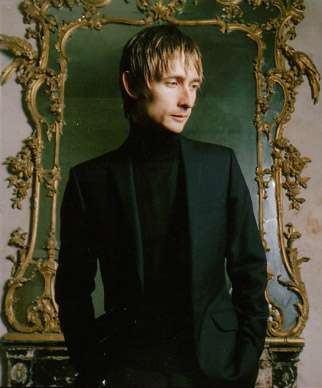The Divine Comedy (band)

The Divine Comedy is a British Baroque Pop band fronted by Neil Hannon.
The first incarnation of the band dates from 1989 when Hannon and two other musicians had released an album called Fanfare for the Comic Muse. The album flopped and the band split up. In 1993 Hannon started over with what is considered the official first Divine Comedy album, Liberation. Though sales were modest in Britain, Hannon's quirky, intellectual and gently self-ironic style earned him a fair bit of success abroad, especially in France. This early fame across the Channel resulted in Hannon working on and off throughout the following years for the French music newsmagazine Les Inrockuptibles, conducting interviews of such singers as Jarvis Cocker and Björk.
Having received confirmation of his musical abilities, Hannon released Promenade in 1994, an album that references Michael Nyman and is reminiscent of the films of Peter Greenaway; even more than Liberation, it is replete with artistic and literary allusions (the song "The Booklovers" is simply a long list of writers' names, while the song "When the Lights go out all over Europe" uses elements of the soundtrack from a Godard film).
During this phase Hannon cultivated the persona of a dapper dandy, appearing in public clad in impeccable suits. He toured Europe alongside Tori Amos and, with Björk's encouragements, released Casanova. The album was his greatest commercial success to date, and was followed by the equally successful A Short Album about Love and Fin de Siècle.
The Divine Comedy attempted to become more than just Neil Hannon and interchangeable backup musicians with the more mainstream album Regeneration in 2001, but the experience only convinced Hannon that he could only express his vision by retaining exclusive authorship and control. Absent Friends was released in 2004, Victory for the Comic Muse (a wink to the band's first album) in 2007 and The Duckworth Lewis Method in 2009. Hannon also provided vocals for the soundtrack releases for the Doctor Who 2005 and 2006 Christmas special songs "Song for Ten" and "Love Don't Roam", and the soundtrack of the movie adaptation of The Hitchhiker's Guide to the Galaxy.
- Canon Discontinuity: Fanfare For The Comic Muse has been completely disowned.
- Everyone Can See It: "Everybody Knows (Except You)"
- French Jerk: A female version is the subject of "The Frog Princess".
- I Am the Band: Neil Hannon very much is The Divine Comedy.
- Incredibly Long Note: The end of "Can You Stand Upon One Leg?"
- He's got the skill to do it in a couple of others too; "Our Mutual Friend" and "The Summerhouse" come to mind.
- In the Style Of: "I've Been To A Marvelous Party". Only The Divine Comedy could even think of taking a Noel Coward song and laying on some thumping techno, never mind actually making it work.
- Literary Allusion Title: The name of the band is (obviously) inspired by Dante's eponymous masterpiece.
- ...Which Neil didn't actually read until a few years into his career.
- Lyrical Dissonance: A recurring trope in their songs:
- "Something for the Weekend" is a very jaunty number about a man being attacked and robbed by his girlfriend.
- "The Complete Banker" is an upbeat tune about the malpractice of the financial sector leading up to the global recession.
- "The Pop Singer's Fear of the Pollen Count," a catchy, cheerful track about the effects of hayfever (though it IS about how he takes it in his stride).
- Ode to Intoxication: "A Drinking Song".
- Perky Goth: "The Happy Goth".
- Stroke Country: "Sunrise".
- You Don't Want to Die a Virgin, Do You?: "To Die a Virgin" from Victory for the Comic Muse.